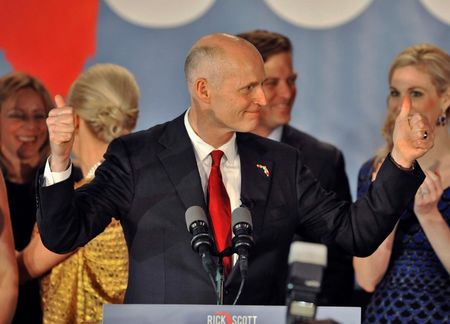By David Adams
MIAMI (Reuters) - Florida Governor Rick Scott's re-election on Tuesday once again demonstrated the Republican Party's dominance in statewide elections, having won five successive gubernatorial races.
Presidential elections are another matter.
Twice over the last six years Florida voted for U.S. President Barack Obama, and political observers warned against reading too much into the Republican Party's win on Tuesday when looking ahead to the 2016 presidential elections.
A major national prize, Florida trails only California and Texas in electoral votes. Unlike those states, solidly Democratic and Republican, respectively, Florida is decidedly up for grabs. In the last 10 presidential contests, the state has voted for the winning candidate nine times, nearly evenly split between Republican and Democratic hopefuls.
Most notably, Florida became the key battleground when the 2000 race between Republican Texas Governor George W. Bush and Democratic Vice President Al Gore was too close to call nationally. The Sunshine State gave Bush the White House, but only after a weeks-long wrangle ultimately settled by the U.S. Supreme Court.
In Tuesday's statewide election, Republicans took control of every Cabinet position and hold solid majorities in both houses of the state legislature, yet Scott prevailed over challenger Charlie Crist by just 1 percent, garnering 2.86 million votes to 2.79 million.
"Once again, Florida will be the epicenter of activity in 2016. We're still divided," said Susan MacManus, a political scientist at the University of South Florida. "Everybody leaves this election feeling that they can win in 2016."
A former Republican turned Democrat, Crist failed to inspire the party's base, particularly in key urban areas, exit polls showed. Turnout in Florida on Tuesday barely hit 50 percent statewide, and was close to 40 percent in populous South Florida, a Democratic stronghold.
By contrast, when Obama won the state in the 2008 and 2012 presidential elections, turnout in Miami topped 70 percent.
Crist trounced Scott among African-American voters and performed better than many expected when it came to Cuban-American voters, pulling in 50 percent of the vote and continuing a generational trend that has seen the Republican stranglehold on Cuban exile voters slip.
Crist failed to do as well as expected among Hispanic and younger voters, however, who will be key to any presidential hopeful aiming to win the state in two years.
What's more, Crist could not match Scott's campaign message of economic growth and job creation, which helped the incumbent dominate with white male and female voters, and those over 65.
"If there is one message that was loud and clear it's that Floridians still have a lot of economic anxieties," said MacManus.
The close election should be a wake-up call for Republicans that voters want more spending on education, as well as the expansion of federally funded Medicaid, which Republicans blocked in Florida, said Mike Fasano, a Republican former legislator and a strong supporter of Crist.
"No one is enthusiastic about Rick Scott," Fasano said. "If voters were, he wouldn't have been hanging on by a thread Tuesday night," he said.
Still, Tuesday's victory could provide a solid road map for potential Republican presidential contenders from Florida such as former Governor Jeb Bush and U.S. Senator Marco Rubio, who both campaigned for Scott, as did New Jersey Governor Chris Christie.

"This midterm election was important to the Republican Party nationally. It was a case of all hands on deck," said Justin Sayfie, publisher of the conservative, Florida-based Sayfie Review political news website.
(Additional reporting by Letitia Stein and Saundra Amrhein; Editing by Jonathan Oatis)
